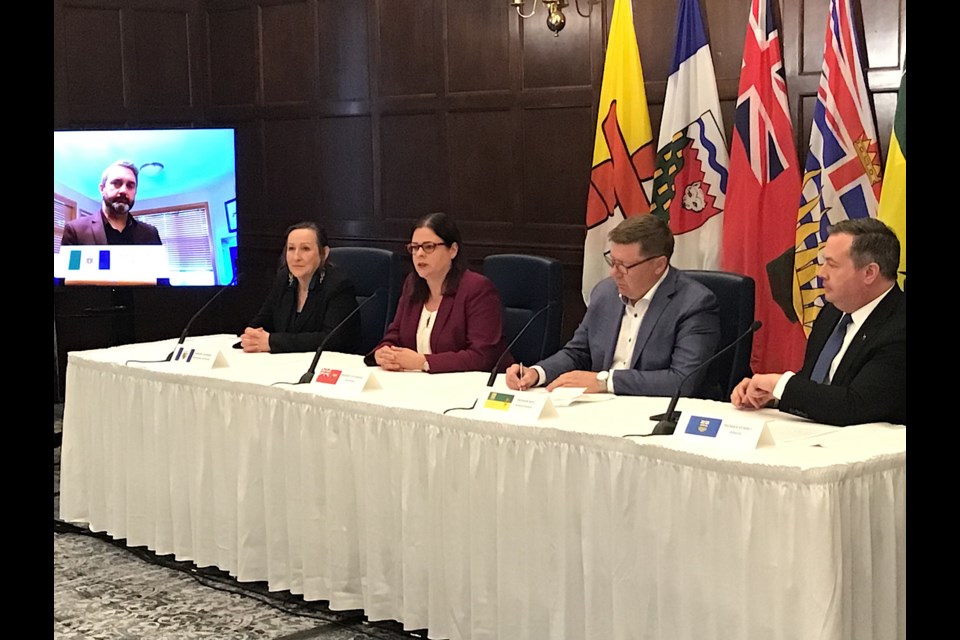REGINA — A range of issues, from health care transfers to inflation and the cost of living, dominated the 2022 Western Premiers Conference in Regina.
The two-day conference in Regina was attended by the first ministers from the four western provinces and two of the three northern territories, and was the first such meeting in two years due to the pandemic.
Health care was a major item discussed during the conference, with premiers calling on the federal government to come to the table to negotiate a renewed health care funding partnership with the provinces.
Other items discussed, which were identified in the communique from premiers issued at the end of the conference, included the post-COVID-19 economy and labour market, supply chain corridors, internal trade, energy and food security and sustainable development and arctic security and sovereignty.
The news conference Friday afternoon was attended by Premier Scott Moe of Saskatchewan, Premier Jason Kenney of Alberta, Premier Heather Stefanson of Manitoba, Premier Caroline Cochrane of the Northwest Territories and Premier Sandy Silver of the Yukon. Premier John Horgan of British Columbia spoke to reporters earlier that morning but was on his way back to B.C. in the afternoon. Nunavut Premier P.J. Akeeagok was unable to attend the conference.
Here are a few highlights from the news conference.
Health care
On health care, the Western premiers once again called on the feds to increase its share of health funding to 35 per cent through the Canada Health Transfer. The premiers also expressed frustration with the failure of the government to discuss health care funding with the provinces and territories, and called for a first ministers meeting to find a resolution.
On this issue, Yukon Premier Silver noted the frustration expressed by premiers Moe, Horgan and Andrew Furey of Newfoundland in trying to get conversations going with the federal government on the Canada Health Transfer. These are the three premiers asked by the Council of the Federation to lead a dialogue with the federal government.
“It saddens us up in the Yukon,” said Silver. “We’re trying to get to a revolution and change in our health care system in the Yukon.”
“John and Scott and Andrew are trying their best to come to an agreement.” He said the premiers and the Yukon were ready to have that conversation.
Premier Kenney called it a unique situation, pointing to a "demographic time-bomb" with a lot more older Canadians needing care. He also noted, "We are all backed up massively in surgical wait times."
He called health care and surgical wait times and the cost of living the top two issues for Canadians right now. "These are national priorities and we need the national government to step up."
Post COVID-19 economy and labour market
On the economy, the premiers called on the federal government to strengthen its partnership through labour market transfer agreements to ensure sufficient, flexible and reliable funding to support the workforce.
They also called on the feds to work with provinces on economic immigration planning, and also identified long-term sustainable and flexible investment in housing as necessary for economic growth and job creation.
Premier Moe noted that it was a “challenging labour market that we are seeing in our respective jurisdictions as we find our way through this global pandemic.”
Premier Stefanson cited shortages in the nursing area in Manitoba.
"Immigration is obviously a big part of that," said Stefanson, adding they "want to ensure that we break down those barriers for getting licensed, licensure and other barriers out there."
Supply chain corridors and internal trade
On supply chain issues, the premiers discussed the challenges in getting products to market, noting the challenges of the pandemic, Russia’s war in the Ukraine and rising food and energy prices.
The Western premiers reiterated their commitment to reduce barriers to internal trade. They called on the feds to accelerate work to address barriers and its areas of jurisdiction.
Energy and food security and sustainable development
Global energy and food demands were identified by the premiers as key issues. Particularly expressed was concern about rising food and energy prices.
“The most important question on the minds of Canadians and Western Canadians and all Canadians is inflation, cost of living,” said Premier Kenney.
He noted what was driving it up was “the cost of energy.”
Kenney called it a “crisis,” brought on by “lack of investment in oil and gas exploration and development” partly due to “anti-energy policies coming from Ottawa and other countries,” and also Russia’s "outrageous” invasion of Ukraine. “These two things together are the perfect storm.”
Arctic security and sovereignty
The Northern premiers raised the issue of arctic security and sovereignty given what was happening with the Russian invasion of Ukraine.
The premiers came out of the meeting agreeing that the arctic was essential to Canadian security sovereignty and economic prosperity and that significant federal investment was required.


